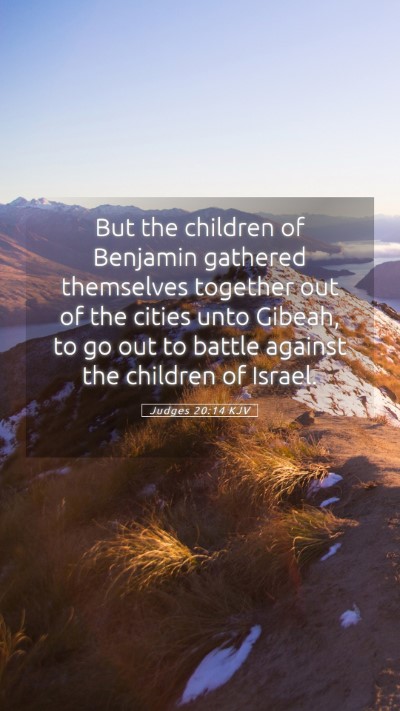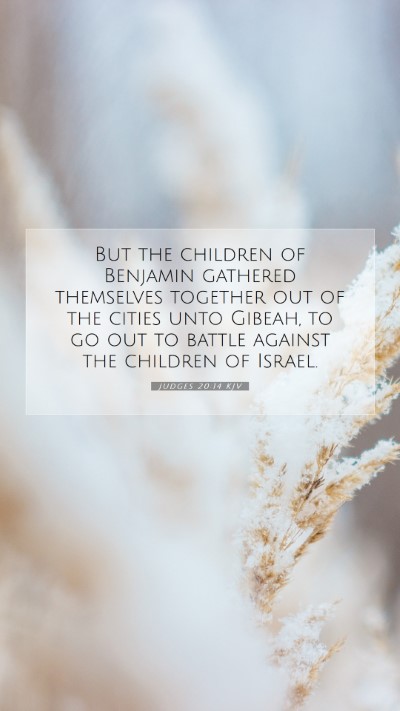Bible Verse Commentary: Judges 20:14
Verse Reference: Judges 20:14
"But the children of Benjamin gathered themselves together out of the cities unto Gibeah, to go out to battle against the children of Israel."
Summary of Judges 20:14
This verse highlights a significant moment during the conflict between the tribe of Benjamin and the rest of the Israelites. It sets the stage for an imminent battle, illustrating a time of deep division and strife among God's chosen people. Here, the Benjamites are shown uniting to face the collective tribes of Israel, indicating both tribal loyalty and the serious tensions that had escalated among the twelve tribes.
Interpretations and Insights
-
Matthew Henry's Commentary:
Henry reflects on the alarming unity of the tribe of Benjamin, emphasizing their determination to defend their city, Gibeah, at all costs. He portrays their readiness as not just a physical battle but also a spiritual one, suggesting that the situation demonstrates the severity of moral corruption and the consequences of straying from God’s laws.
-
Albert Barnes' Notes:
Barnes interprets this gathering as indicative of the solidarity among the Benjamites amidst their moral failings. He notes that despite the atrocities committed by certain individuals in Gibeah, the tribe as a whole shows fierce loyalty and readiness to fight against Israel. This raises questions about the collective responsibility of a community in times of moral crisis.
-
Adam Clarke's Commentary:
Clarke highlights the desperate situation that led to this assembly of soldiers in Gibeah. He points out the historical and sociological implications of their decision to engage in battle, suggesting that tribal identities often override ethical considerations, which is a reflection of the societal breakdown that occurred before the establishment of kingship in Israel.
Understanding the Context
The events in Judges 20 occur after a heinous crime in Gibeah, where a Levite's concubine was abused and killed. This event galvanized the other tribes of Israel to seek justice, leading to a civil war against the tribe of Benjamin. Judges 20:14 serves as a pivotal moment, marked by the Benjamites’ choice to rally together rather than repenting or addressing the moral failures represented by their kin.
Historical Context
During the time of the Judges, Israel functioned without a central authority, leading each tribe to act according to personal and tribal interest. The gathering of the Benjamites is a historical commentary on how internal conflict poses existential threats to the covenant community. This verse reflects the complexities of tribal loyalties and the consequences of collective sin.
Theological Implications
This passage illustrates the tension between justice and loyalty. It encourages modern readers to reflect on the dangers of prioritizing loyalty to a group over adherence to divine commandments. Furthermore, it exemplifies how communities can sometimes rally in defense of the wrong rather than pursuing righteousness.
Application for Today
For contemporary readers, Judges 20:14 serves as a stark reminder of the importance of standing for righteousness, even when it means standing against one’s own community. It challenges believers to consider whether they are advocating for justice and morality in their contexts or simply going along with the crowd.
Cross References
- Judges 19:22-30: The events leading to the conflict.
- Judges 21:9-15: The aftermath of the battle against Benjamin.
- 1 Samuel 14:38-42: Another account of Israel’s internal strife.
Key Takeaways
- This passage highlights tribal allegiance amidst moral failure.
- It challenges readers to consider the implications of community loyalty.
- Judges 20:14 sets the stage for exploring themes of justice, morality, and repentance.


